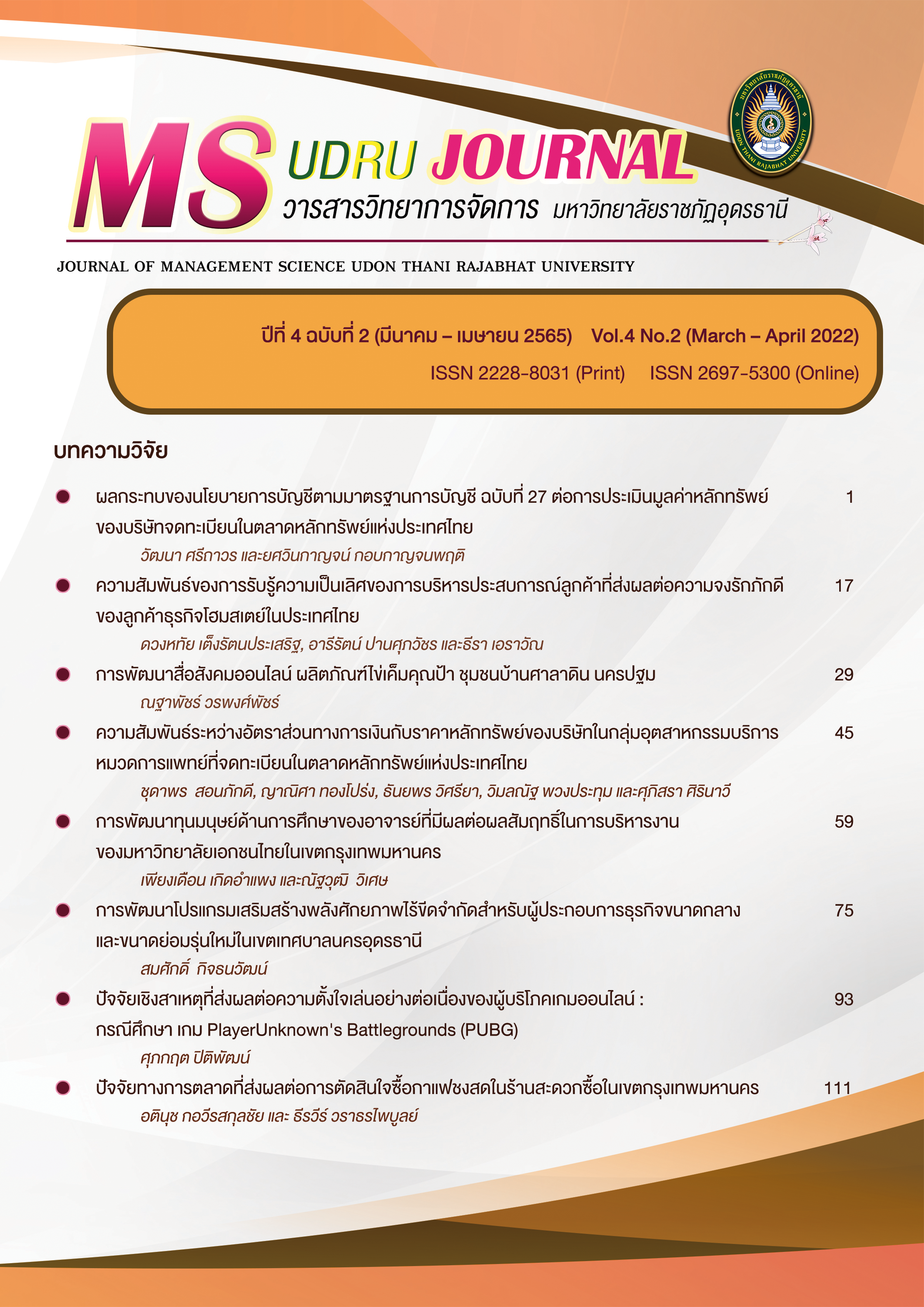การพัฒนาโปรแกรมเสริมสร้างพลังศักยภาพไร้ขีดจำกัดสำหรับผู้ประกอบการธุรกิจขนาดกลางและขนาดย่อมรุ่นใหม่ในเขตเทศบาลนครอุดรธานี
Main Article Content
บทคัดย่อ
การวิจัยครั้งนี้มีวัตถุประสงค์เพื่อพัฒนาโปรแกรมเสริมสร้างพลังศักยภาพไร้ขีดจำกัดสำหรับผู้ประกอบการธุรกิจขนาดกลางและขนาดย่อมรุ่นใหม่ในเขตเทศบาลนครอุดรธานี โดยใช้หลักการจัดกิจกรรมตามแนวมนุษยนิยมและการเพิ่มพลังศักยภาพตนเองของแอนโทนี่ ร็อบบินส์ ใช้การวิจัยกึ่งทดลอง โดยรูปแบบการทดลองมี 2 กลุ่ม คือ กลุ่มทดลองและกลุ่มควบคุม กลุ่มทดลองเข้าร่วมโปรแกรมเสริมสร้างพลังศักยภาพไร้ขีดจำกัดโดยแบ่งออกเป็น 2 ส่วน ได้แก่ ส่วนที่ 1 คือ การเข้าร่วมสัมมนาเชิงปฏิบัติการหลักสูตร “การพัฒนาพลังศักยภาพไร้ขีดจำกัดสำหรับผู้ประกอบการธุรกิจขนาดกลางและขนาดย่อมรุ่นใหม่ในเขตเทศบาลนครอุดรธานี” เป็นระยะเวลา 2 วันตั้งแต่เวลา 08.00 - 17.00 น. และส่วนที่ 2 คือ การทำแบบฝึกหัดใน “โปรแกรม 30 วันสู่พลังศักยภาพไร้ขีดจำกัด” เครื่องมือที่ใช้ในการวิจัย ได้แก่ แบบวัดพลังศักยภาพบุคคล วิเคราะห์ข้อมูลโดยการทดสอบความแตกต่างของค่าเฉลี่ยคะแนนพลังศักยภาพบุคคลด้วยวิธีการทดสอบค่าที ผลการวิจัยพบว่า คะแนนพลังศักยภาพบุคคลหลังการทดลองของกลุ่มทดลองสูงกว่ากลุ่มควบคุมอย่างมีนัยสำคัญทางสถิติที่ระดับ .05 (t-test = 6.2957*) และความแตกต่างของค่าเฉลี่ยคะแนนพลังศักยภาพบุคคล หลังการทดลองระหว่างกลุ่มทดลองและกลุ่มควบคุม พบว่า ค่าคะแนนพลังศักยภาพบุคคล หลังการทดลองของกลุ่มทดลองสูงกว่ากลุ่มควบคุมอย่างมีนัยสำคัญทางสถิติที่ระดับ .05 (t-test = 2.3954*) โดยมีคะแนนพลังศักยภาพบุคคลสูงขึ้นมากกว่าร้อยละ 5 ทั้ง 5 ด้าน ได้แก่ ด้านการมีความเป็นผู้นำร้อยละ 14.40 ด้านการมีวิสัยทัศน์ร้อยละ 12.95 ด้านการทำงานเป็นทีมร้อยละ 15.13 ด้านการมีทัศนคติด้านบวกร้อยละ 13.82 และด้านความสามารถในการปรับตัว ร้อยละ 10.00 ตามลำดับ การพัฒนาโปรแกรมเสริมสร้างพลังศักยภาพไร้ขีดจำกัดสำหรับผู้ประกอบการธุรกิจขนาดกลางและขนาดย่อมรุ่นใหม่ในเขตเทศบาลนครอุดรธานี ได้ใช้หลักการจัดกิจกรรมตามแนวมนุษยนิยมและการเพิ่มพลังศักยภาพตนเองของแอนโทนี่ ร็อบบินส์ ดังนี้ 1) การปลดปล่อยให้เป็นอิสระ 2) การสร้างพลังความเชื่อมั่น 3) การลงมือปฎิบัติ 4) การมีความสุขสนุกสนาน 5) การสร้างกำลังใจ 6) การเสริมแรง 7) การรู้จักตัวเอง 8) การสร้างอุนิสัย 9) การสร้างปฎิสัมพันธ์ และ 10) การมีส่วนร่วม
Article Details

อนุญาตภายใต้เงื่อนไข Creative Commons Attribution-NonCommercial-NoDerivatives 4.0 International License.
บทความที่ได้รับการตีพิมพ์เป็นลิขสิทธิ์ของคณะวิทยาการจัดการ มหาวิทยาลัยราชภัฏอุดรธานี
ข้อความที่ปรากฏในบทความแต่ละเรื่องในวารสารวิชาการเล่มนี้
ไม่ใช่ความคิดเห็นและความรับผิดชอบของผู้จัดทำ บรรณาธิการ กองบรรณาธิการ และคณะวิทยาการจัดการ มหาวิทยาลัยราชภัฏอุดรธานี ความรับผิดชอบด้านเนื้อหาและการตรวจร่างบทความแต่ละเรื่องเป็นความคิดเห็นของผู้เขียนบทความแต่ละท่าน
เอกสารอ้างอิง
บุรัญชัย จงกลนี. (2560). สู่…อิสรภาพ. ขอนแก่น: เพ็ญพริ้นติ้ง.
สุวิทย์ มูลคำ. (2560). เรียนรู้สู่ครูมืออาชีพ. กรุงเทพมหานคร: ที.พี.พรินท์.
Covey, S. R. (2018). The 7 Habits of Highly Effective People. New York: ireside.
Harry, A., & Berry, H. (2000). NLP in 21 Days: A Complete Introduction and Training Program. Judy Piatkus (Publishers).
Maltz, M. (2000). Psycho - Cybernetics 2000. New York: Simon and Schuster.
Pease, A. (2017). Body Language. Australia: Harper-Collins Pty.
Robbins, A. (2016). Success Journal. San Diego: Robbins Research International.
Sayler,J. & Alexander, W.M. (1986). Curriculum Planning for Modern School. New York: Holt, Rinehart and Winston.
Steve, A. (2014). NLP: The New Science of Achievement. Nicholas Brealey Publishing.
Townsend, R. (1995). Learning Wealth. Australia: Murray Child & Company Pty.


